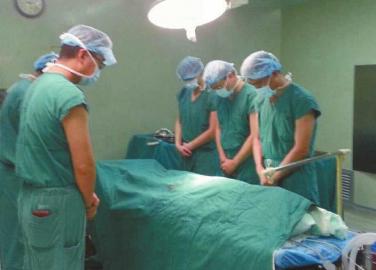
Medical workers bowed to Yang Huaiyuna whose family donated his organs after his death in Sichuan, April 6,2015. (Photo/West China City Daily)
Five people have lived on Yang Huaiyuan's donated body organs since he was announced brain dead on April 3.
His heart, lungs, liver and kidneys have been successfully transplanted to five patients from Sichuan, Fujian and Hubei and they are currently functioning well. His corneas have also been preserved for those in need.
"He always liked to help others and he would like to do this (donation)," said Yang's mother Zhang Zun'e, who decided to donate Yang's body parts after the 39-year-old Sichuan man died in a car crash.
Yang's body will help at least seven people, according to Deng Shaoping, president of the Sichuan Provincial People's Hospital.
In China, many believe in the tradition of keeping the entire body for the dead in order to help their reincarnation or enable them better lives in the afterlife.
But as the nation progresses, organ donation has become a more acceptable alternative with encouragement from the central government.
In 2014, there were 1,700 donors giving more than 5,000 organs, exceeding the total number of the previous five years.
Despite the increase in donors, their is still a vast gap for supply and demand.
And the gap may continue to expand.
On January 1, China banned the harvesting of organs from executed prisoners, which was a major source of transplants.
"The donors are too few, and usually a patient has to wait for 1.5 to 3 years for a lung. Many died while waiting," said Chen Jingyu, a member of the Chinese Society of Organ Transplantation.
Liu Deruo, a noted thoracic surgeon with the China-Japan Friendship Hospital, said he last performed a lung transplant four years ago simply because no lungs are available for the desperate patients.
However, Huang Jiefu, head of a national human organ donation and transplant committee, said the ban, aimed to preserve justice and human right, would not aggravate the shortage of organs for transplant in the long run.
















































